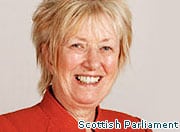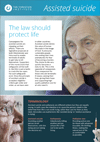Plans to legalise assisted suicide in Scotland are being opposed by a leading forensic pathologist and members of the Scottish Parliament’s Justice Committee.
Professor Anthony Busuttil, of Edinburgh University, said that legalisation would break a bond of trust between patients and doctors.
Christine Grahame, the convener of Holyrood’s Justice Committee, has warned that the proposed legislation would put “unintended pressure” on those who are considering assisted suicide.
Voice of opposition
Oral submissions on the Assisted Suicide (Scotland) Bill will be heard from today by the Health and Sport Committee.
The committee will hear from the legal profession, the medical profession, ethicists, palliative care specialists and faith groups in the coming weeks.
Professor Busuttil stressed that legalising assisted suicide would upset cherished legal and medical principles.
Broken trust
He said: “Doctors from the word go have had a duty of care to their patient which is based on trust.
“If they start to harm people even with their consent, they are breaking that eternal trust between patient and doctor”.
Professor Busuttil also highlighted specific concerns that vulnerable 16-year-olds could be more easily swayed into a decision to end their life.
Pressure
He advised that other measures need to be taken to improve care for people with incurable illnesses, such as better funding for hospices.
The Justice Committee raised concerns about imposing a time limit within which people would be allowed to commit suicide.
It warned that a proposed two-week “prescription” for assisted suicide would pressurise terminally ill people to make a decision, rather than feel able to change their mind.
Catastrophe
A spokesman for campaign group Care Not Killing said that legalising assisted suicide would be a “catastrophe in terms of how our society confronts illness and disability”.
In October last year, the group called on MSPs to oppose assisted suicide legislation calling it “unnecessary, unethical and uncontrollable”.
The new Bill seeks to allow patients as young as 16 to end their lives, even if they are not terminally ill.


